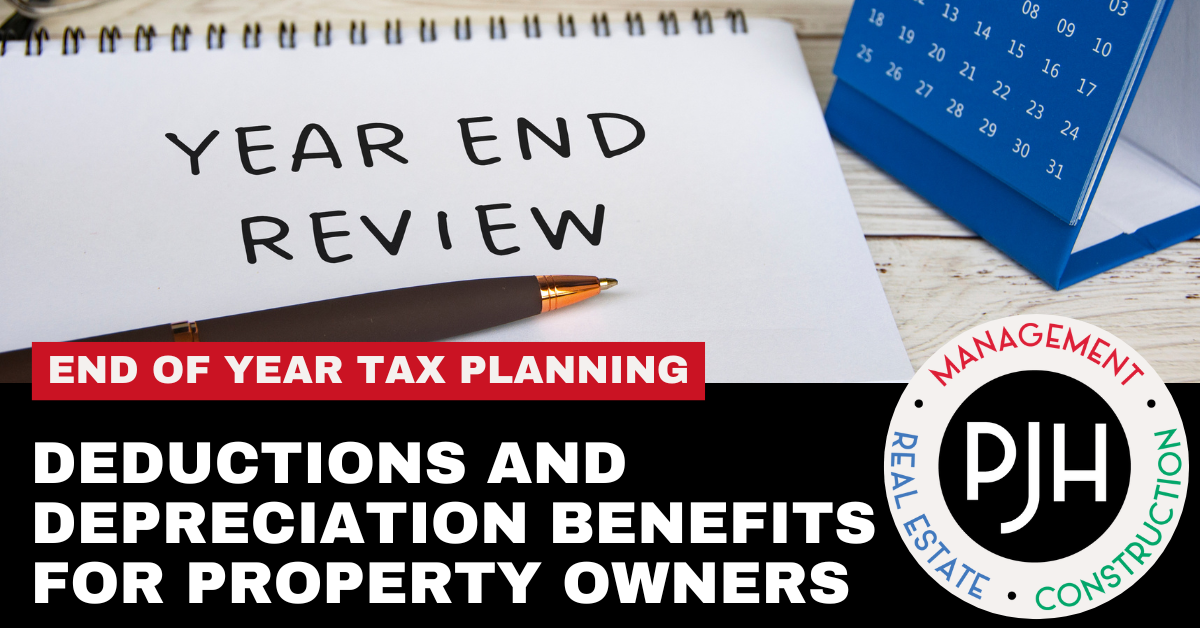Maximizing Your Year-End Tax Savings: Deductions and Depreciation Benefits for Property Owners
As we approach the end of the year, it’s time for property owners and investors to start thinking about tax planning. While owning real estate is a fantastic way to build wealth, it’s also a great opportunity to take advantage of tax deductions and depreciation benefits that can save you thousands of dollars. If you own rental properties, or are looking to invest, the end of the year is your moment to make strategic moves that maximize your return.
Let’s talk about how you can keep more of your hard-earned money by tapping into these tax-saving opportunities.
Key Tax Deductions Every Property Owner Should Know
Owning property comes with many costs, but the good news is that most of those expenses can be deducted from your taxes. Here are a few of the top deductions that every property owner should be aware of:
Mortgage Interest
The interest you pay on your mortgage is often one of the largest deductions. For rental properties, the interest paid on loans used to acquire or improve the property is deductible, helping you offset rental income.
Property Taxes
Any property taxes paid to state or local governments are fully deductible. This includes taxes on both rental properties and primary residences.
Repairs and Maintenance
Those small repairs—like fixing a leaky faucet or repairing a broken fence—add up. The good news? They’re deductible. Any repairs that are necessary to keep the property in good condition can be written off in the year they occur.
Operating Expenses
Running your rental property comes with various day-to-day costs, from property management fees to utility bills. These expenses can be deducted as long as they’re directly related to managing and maintaining the property.
Insurance Premiums
Whether it’s property insurance, liability insurance, or any other form of coverage, the premiums you pay for protecting your investment are deductible.
Professional Services
Hiring a lawyer, accountant, or real estate professional to help you manage your properties or handle legal matters? Their fees are also deductible, so you can get the help you need while reducing your tax liability.
Depreciation: The Best Kept Secret in Real Estate
Now let’s talk about depreciation. This is one of the most powerful tax-saving tools available to property owners, yet it’s often overlooked. Depreciation allows you to deduct the cost of the property over its useful life, typically 27.5 years for residential properties. The beauty of it? You can claim this deduction every year, even if your property is increasing in value!
Here’s how it works:
•If you buy a rental property for $275,000 (not including the land value), you can deduct around $10,000 each year for 27.5 years. That’s $10,000 in savings right off your rental income!
•And if you’ve made improvements to the property—like a new roof or updated kitchen—you can depreciate those upgrades as well, adding even more to your annual deductions.
Depreciation isn’t just about reducing your taxable income; it’s about strategically building wealth by lowering your tax burden each year. Whether you’re planning on holding your property long-term or selling it down the road, depreciation helps increase your overall return.
Why Now is the Time to Act
If you haven’t taken full advantage of these tax strategies, now is the time to act. Year-end tax planning isn’t just about scrambling in December; it’s about being proactive and making moves now that set you up for success come tax season.
For example, consider making repairs or renovations before the end of the year so you can claim those deductions sooner. Also, ensure your depreciation schedules are accurate—if you’ve recently made upgrades or purchased new rental properties, this is a great time to start maximizing those benefits.
Bonus Tip: 1031 Exchange for Deferring Taxes
One more tool in your tax-saving arsenal is the 1031 exchange. If you’re looking to sell one investment property and purchase another, a 1031 exchange allows you to defer paying capital gains taxes by reinvesting the proceeds into a new property. This means you can continue growing your portfolio without taking a tax hit.
While this won’t directly affect your year-end taxes, it’s a great long-term strategy to keep in mind when planning your next big investment.
Final Thoughts: Make Every Dollar Work for You
Real estate offers some of the most attractive tax benefits of any investment vehicle, but those benefits are only valuable if you take advantage of them. As a property owner, making smart tax decisions now can result in thousands of dollars in savings.
If you want to explore how to maximize your deductions and use depreciation to your advantage, don’t wait—take action before the year ends. Whether you’re a seasoned investor or just starting out, it’s always a good idea to have a plan in place to minimize your tax burden and increase your overall return.
- Learn more! Read some of our related articles or stop by our You Tube channel.
- Schedule a free 15 minute call with one of our Real Estate Professionals to ask questions, start the process to buy or sell, or get financial advice!






